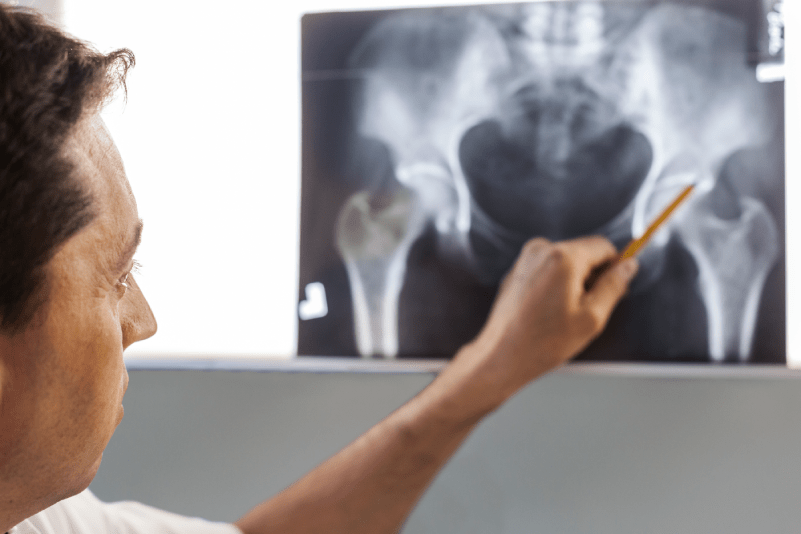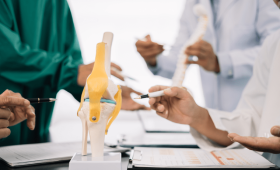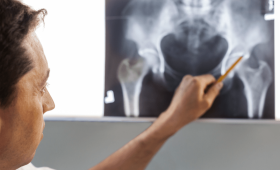What Is Hip Replacement Surgery And Who Needs It?
Hip Replacement Surgery (Total Hip Arthroplasty) is a surgical solution applied to patients suffering from severe pain and limited mobility due to permanent damage in the hip joint caused by conditions like osteoarthritis (joint wear), rheumatoid arthritis, avascular necrosis, or trauma. During this operation, the damaged joint surfaces are removed and replaced with a prosthesis made of artificial materials (metal, ceramic, and polyethylene). The primary goal of the surgery is to relieve the patient’s pain, increase the range of motion of the hip joint, and enable a return to daily life activities. You can contact Cure Holiday to guide you through this critical decision-making process and connect you with experienced orthopedic surgeons.
What Are The Types Of Hip Prostheses And How Are They Selected?
Hip prostheses typically consist of different surface combinations, such as metal-polyethylene, ceramic-polyethylene, and ceramic-ceramic, and are divided into two main groups: cemented (using bone cement) or uncemented (fusing directly to the bone). The type of prosthesis is determined by the surgeon, considering factors like the patient’s age, bone quality, activity level, and overall health condition. Uncemented, long-lasting prostheses are generally preferred for younger and more active patients, while cemented prostheses may be more suitable for older patients with lower bone quality. For the most accurate choice, you can consult expert surgeons through Cure Holiday who prioritize patient-specific outcomes.
What Are The Most Common Indications (Justifications) For Surgery?
The most common indication for hip replacement surgery is advanced osteoarthritis (wear and tear) resulting from the deterioration of cartilage in the hip joint, and the severe, persistent pain that this condition causes. Additionally, damage caused by inflammatory joint diseases such as rheumatoid arthritis, avascular necrosis (AVN) resulting from impaired blood supply to the hip bones, and deformities caused by previous hip fractures are significant reasons necessitating surgery. When pain and mobility restrictions severely reduce a person’s quality of daily life, it becomes the determining factor in the decision to proceed with surgery.
What Is The Average Duration Of Total Hip Arthroplasty Operation?
Total Hip Arthroplasty, when performed in a standard case by an experienced surgical team, is completed in approximately 1 to 2 hours. However, this duration can vary depending on the patient’s anatomical structure, the severity of the hip deformity, whether previous surgeries have been performed, and the type of prosthesis to be used. Revision surgeries (replacement) or challenging cases involving bone deficiencies may take longer. The operation time is important as it directly affects the total time spent under anesthesia and the concentration of the surgical team.
What Are The Main Risks And Complications Of Hip Replacement Surgery?
As with any major surgical procedure, hip replacement surgery carries potential risks and complications. The most commonly encountered issues include infection, prosthesis dislocation (coming out of place), leg length discrepancy, blood clot formation (deep vein thrombosis), nerve damage, and, rarely, fractures around the prosthesis. The risk of infection is minimized in modern hospitals through strict sterilization protocols and the use of antibiotic bone cement. Detailed pre-operative assessment of your risk factors is a crucial step in preventing possible complications; Cure Holiday will guide you through this rigorous process.
What Is The Average Lifespan Of A Hip Prosthesis And When Is It Replaced?
The lifespan of modern hip prostheses typically ranges between 15 and 25 years, depending on the quality of the materials used, the patient’s activity level, and the success of the surgical technique. Prosthesis replacement (revision surgery) is usually required when the components wear out, loosen, or become infected. Thanks to advancements in technology, the durability of prostheses has increased significantly, especially when ceramic and advanced polyethylene surfaces are used. Adhering to the doctor’s post-operative advice and follow-ups is essential to maximize the lifespan of the prosthesis and maintain quality of life.
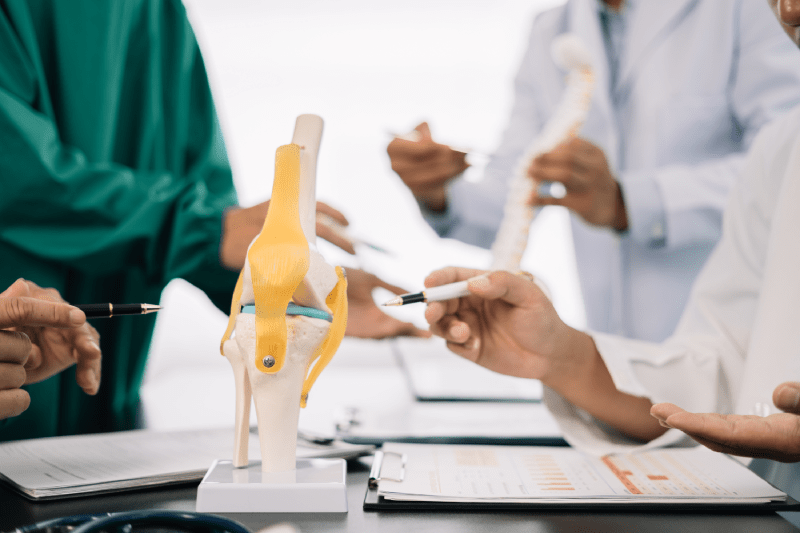
How Long Does The Full Recovery Process Take After Surgery?
The full recovery process after hip replacement surgery typically ranges from 3 to 6 months, depending on the patient’s overall health and adherence to the rehabilitation program. Patients usually stand up and start walking with the aid of a walker or crutches a few days after the surgery. The first 6 weeks are the most critical period, requiring caution against the risk of prosthesis dislocation. While returning to normal daily activities and driving may take 6-8 weeks, achieving full strength and endurance can take up to 6 months or longer.
How Is Pain Management Provided After Surgery?
Pain management after hip replacement surgery is vital for patient comfort and early mobilization. Modern surgical approaches, combined with nerve blocks applied during surgery and multimodal analgesic regimens (a combination of different medications) applied post-operatively, result in very successful pain control. Patients typically receive strong intravenous painkillers during the first few days, and continue to be supported with oral medication after discharge. Cure Holiday ensures that effective and personalized pain control protocols are implemented in all partner hospitals, facilitating a comfortable and faster recovery.
How Soon Can Patients Walk After The Operation?
One of the greatest advantages of hip replacement surgery is the very early mobilization of the patient. Patients are usually helped to stand up and walk, bearing weight with the assistance of a physiotherapist and using a walker or crutches, on the evening of the surgery or, at the latest, the next morning. This early mobilization not only speeds up recovery but also reduces risks like blood clot formation. The speed of starting to walk is personalized based on the patient’s pre-operative condition and their initial response to the surgery.
What Is The Importance Of Physiotherapy And Rehabilitation After Surgery?
Physiotherapy and rehabilitation are the keys to the long-term success of hip replacement surgery. Rehabilitation, which begins immediately after the surgery, ensures the strengthening of the muscles around the hip, the restoration of the joint’s range of motion, and the patient’s relearning of the correct walking pattern. Physiotherapy sessions increase the stability of the prosthesis and help the patient return to daily life without pain. Regular adherence to the exercise program recommended by the surgeon and physiotherapist is mandatory for extending the life of the prosthesis.
What Age Range Is Suitable For Hip Replacement Surgery?
There is no definitive upper age limit for hip replacement surgery; it can be successfully performed even on patients over 90 years old whose general health condition is suitable. The lower age limit is usually considered in cases where cartilage damage is advanced and severely reduces the patient’s quality of life. High-quality materials and special surgical techniques are preferred for young patients to ensure the prosthesis is long-lasting. The surgical decision is based on the patient’s biological age and activity expectations rather than just their chronological age.
How Soon Can I Start Driving After The Surgery?
The time it takes to resume driving after hip replacement surgery usually depends on which leg was operated on and the surgical technique used. Patients who had surgery on their left hip can start earlier (around 4-6 weeks) if they drive an automatic car. However, for those with right hip surgery, avoiding driving for an average of 6 to 8 weeks is essential for safety until the ability to safely press the gas and brake pedals is fully regained. You should not get behind the wheel without the explicit approval of your surgeon.
What Are The Prices Of Hip Replacement Surgery In Turkey?
Hip Replacement Surgery prices in Turkey are highly competitive and economical compared to similar high-quality services in Europe and America. Prices vary depending on several factors, including the type and brand of the prosthesis used, the hospital’s technological equipment, the surgical team’s experience, and the length of the hospital stay. Obtaining a precise and transparent price quote is essential for proper budget management. Cure Holiday assists in creating a personalized treatment plan, providing the clearest information on costs, and preventing surprise expenses.
What Are The Main Factors Affecting The Cost?
The most fundamental factor influencing the cost of hip replacement surgery is the type, quality, and origin (whether it is an imported product) of the prosthesis to be used. Other significant factors include the length of the hospital stay, whether revision (replacement) surgery is necessary (which is more expensive), the extent of pre-operative comprehensive tests, and the scope of the post-operative physiotherapy program. Furthermore, the expertise of the surgical team and the hospital’s level of international accreditation also play a determining role in pricing. Cure Holiday experts will perform this detailed cost analysis for you.
Are Hospital Accommodation And Intensive Care Included In The Prices?
The vast majority of health tourism packages in Turkey include the standard hospital accommodation period (usually 4 to 6 days) required immediately after the surgery in the costs. Short-term intensive care needs after the operation (such as the first night) are also generally part of the package content. However, unexpectedly long or unplanned intensive care stays due to the patient’s general health condition may emerge as an additional cost factor. Clarifying these package details with Cure Holiday is crucial for budget planning.
Are Pre-Operative Tests Included In The Fee?
Routine tests performed before hip replacement surgery, such as detailed blood analyses, ECG, chest X-ray, and specific hip X-rays for surgery, are usually included in the treatment package. This allows the patient to quickly proceed with the surgery upon arrival in Turkey. However, if the patient has a pre-diagnosed heart condition and requires additional consultations from different branches (like cardiology, pulmonology) or advanced tests (like angiography), these extra costs may not be included in the initial quote. You can clarify this scope by consulting with Cure Holiday.
How Does The Quality And Brand Of The Prosthesis Affect The Price?
The quality, surface material, and brand of the hip prosthesis to be used are among the biggest determining factors of the total cost. Internationally recognized, FDA or CE approved, long-lasting, and high-performance (e.g., ceramic) prostheses are more costly than standard metal-polyethylene prostheses. Many accredited hospitals in Turkey prefer to use the highest quality prostheses for the patient’s long-term success. Cure Holiday will transparently share the origin, technical specifications, and cost impact of the prosthesis with you, helping you make the right choice.
Are Post-Operative Physiotherapy Sessions Included In The Price Quote?
Physiotherapy services, which are essential for recovery after hip replacement surgery, may be included in health tourism packages differently. Some comprehensive packages may include a certain number of physiotherapy sessions to be received during the hospital stay and the remaining time in Turkey after discharge. However, long-term rehabilitation programs that you must continue after returning to your home country are generally outside the package. Obtaining clear information from Cure Holiday regarding the number and scope of physiotherapy sessions you will receive in Turkey is vital for the continuous progress of your recovery.
Why Is The Price Difference Of Surgery In Turkey So High Compared To Europe?
The main reason why hip replacement surgeries in Turkey are more economical compared to Europe or America is the combination of lower general operating costs, personnel expenses, and currency advantages. Even though hospitals offer state-of-the-art equipment and international standards of service, the lower labor costs and different profit margins create a cost advantage. This situation allows you to access world-class treatment at much more affordable prices without compromising surgical quality. Cure Holiday utilizes this advantage most efficiently for your benefit.
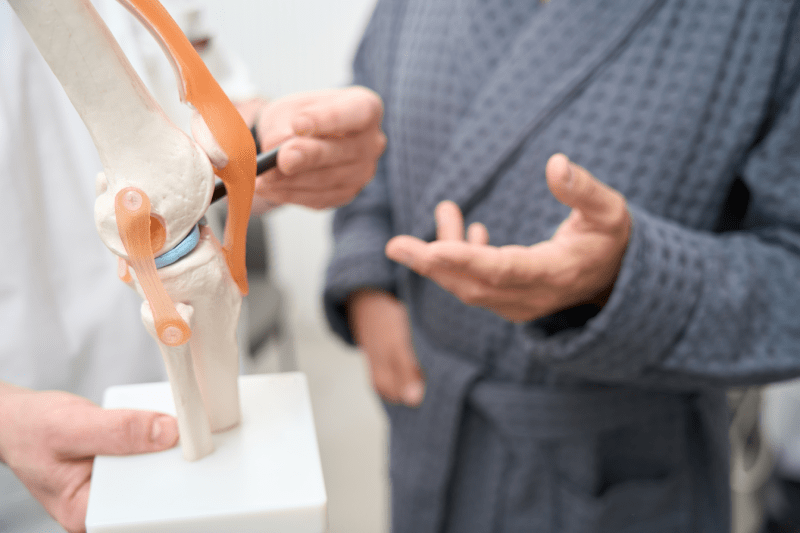
Are Post-Operative Check-Ups Included In The Fee?
Treatment packages generally cover all doctor examinations, wound care, and suture removal procedures performed during the patient’s stay in Turkey (before discharge and the final check-up before leaving the country). These check-ups are mandatory for the surgical team to ensure the prosthesis placement and wound healing are satisfactory. However, routine check-ups required at 3-month, 6-month, and yearly intervals after returning home are usually conducted by your local physician, and these costs are not included in the package. Cure Holiday will clearly specify the scope of your final check-up in Turkey.
How Do The Patient’s Age And Bone Quality Affect The Cost?
The patient’s age, and especially bone density, are critical factors that affect the complexity of the surgery and thus the cost. In older patients or those with poor bone quality due to osteoporosis, special techniques (additional cement or screws) or more expensive types of prostheses may be required for secure implant placement. This can extend the surgery time and increase the cost due to extra materials used. In younger patients, the use of the longest-lasting, high-segment prostheses is generally a factor that increases the cost.
What Are The International Quality Standards Of Hospitals In Turkey?
Many leading hospitals in Turkey, particularly those providing services in health tourism, are certified by international accreditation organizations. The most prominent and respected of these is JCI (Joint Commission International) accreditation, based in the USA and recognized globally. These accreditations indicate that the hospitals meet the highest international standards for patient safety, hygiene, and clinical care quality. Cure Holiday collaborates exclusively with fully equipped facilities that adhere to these international standards, aiming to provide you with the most reliable service.
What Is The Best Season Or Time Frame For Surgery?
Hip replacement surgery can be safely performed at any time of the year from a medical perspective. However, to make your recovery period and stay in Turkey more comfortable, spring (April-June) and autumn (September-October) months are generally preferred. During these seasons, temperatures are milder, making post-operative walks and access to physiotherapy sessions easier. Extremely hot summer months or cold winter conditions can limit your mobility and reduce your recovery comfort. Cure Holiday plans your travel and treatment considering these factors.
Is It Mandatory To Quit Smoking Before The Surgery?
Yes, quitting smoking before the surgery is one of the most important and mandatory requests from the surgical team. Smoking severely increases anesthesia risks and slows down post-operative wound healing. Its most critical effect is hindering the process of the prosthesis fusing to the bone (osseointegration) and increasing the risk of infection. Therefore, patients are asked to completely quit smoking at least a few weeks before the operation. Compliance with this rule is vital for a successful surgical outcome.
Is There A Risk Of Prosthesis Dislocation (Dislocation) Recurrence After Surgery?
The risk of prosthesis dislocation after hip replacement surgery is low (generally around 1-3%) thanks to modern surgical techniques and special approaches. However, this risk increases if the patient does not adhere to the restrictions that require avoiding specific bending and twisting movements of the hip, especially during the first 6 weeks after the surgery. Your surgeon will provide you with detailed instructions on which movements to avoid to minimize this risk. Strict adherence to instructions is essential for successful long-term results.
When Can I Return To Normal Daily Life And Sports Activities?
Returning to normal daily life usually occurs between 6 to 8 weeks (light duties, household activities). Low-impact sports like swimming or cycling can be started around 3 months after the surgery, with your surgeon’s approval. High-impact and risky sports like running, jumping, football, or skiing are generally not recommended. It may take 6 months to 1 year for full recovery and prosthesis stability. You should seek advice from a physiotherapist and surgeon through Cure Holiday for your plan to return to sports life.
Is It Possible To Travel To Turkey Alone For The Operation?
As restricted mobility and the need for assistance are expected in the first few days after hip replacement surgery, having a companion with you is strongly recommended. However, if you choose to come alone, a professional health tourism organization like Cure Holiday will provide you with companion support throughout the entire process, from airport transfers to hotel check-in and all procedures within the hospital. Patient coordinators and interpreters are ready to support you 24/7 with all your needs, ensuring you are not alone during the process.
What Is The Average Length Of Stay Required In Turkey For The Treatment Period?
The average duration of your stay in Turkey for hip replacement surgery, including the hospital stay and post-discharge rest/check-up period, typically ranges between 10 to 14 days. After spending an average of 4-6 days in the hospital, it is recommended to rest for another week in a hotel for suture checks and until the surgical team gives approval for safe travel. This time is necessary for the initial follow-up of surgical results and for you to be able to fly safely. Cure Holiday organizes all the necessary accommodation and logistics for this entire period.
Are Companion Accommodation And Transfers Included In The Treatment Packages?
Most health tourism packages cover the companion’s stay in the patient’s room during the hospital accommodation period after the surgery. Furthermore, comprehensive packages offered by Cure Holiday may include the companion’s hotel accommodation, airport transfers, and hospital transfers to a certain extent. These services, planned with your companion’s comfort and needs in mind, allow you to focus entirely on recovery. It is recommended to consult with Cure Holiday for detailed and personalized companion services.
What Medical Documents Are Required Before Traveling To Turkey?
To allow the surgical team in Turkey to pre-assess your condition and plan the surgery, certain essential medical documents are required before you travel. The most important of these include recent hip X-rays (front and side views), Magnetic Resonance (MRI) or Computed Tomography (CT) reports. Additionally, a detailed medical summary report indicating your current health status, chronic diseases if any, and medications you use is mandatory. Cure Holiday will simplify the process by providing you with a list of all required documents.
How Are All Transfers Provided Before And After The Surgery?
Cure Holiday’s health tourism services begin the moment the patient lands at the airport. All transfers from the airport to the hospital or hotel, from the hospital to the hotel, and back to the airport after final check-ups are provided with comfortable and private vehicles. Since your mobility will be restricted after the surgery, these transfer services are vital for a safe and stress-free travel experience. The entire logistics organization is meticulously managed by Cure Holiday’s patient coordinators.
Are Interpreter And Translation Services Included In The Treatment Package?
Communication is crucial in a complex process like hip replacement surgery. Therefore, professional interpreting services are generally included in the treatment packages for international patients. A medical interpreter will accompany you during your hospital stay, doctor consultations, anesthesia consultations, and the complete delivery of discharge instructions. Cure Holiday guarantees this service to ensure you feel comfortable and secure without a language barrier throughout the entire process.
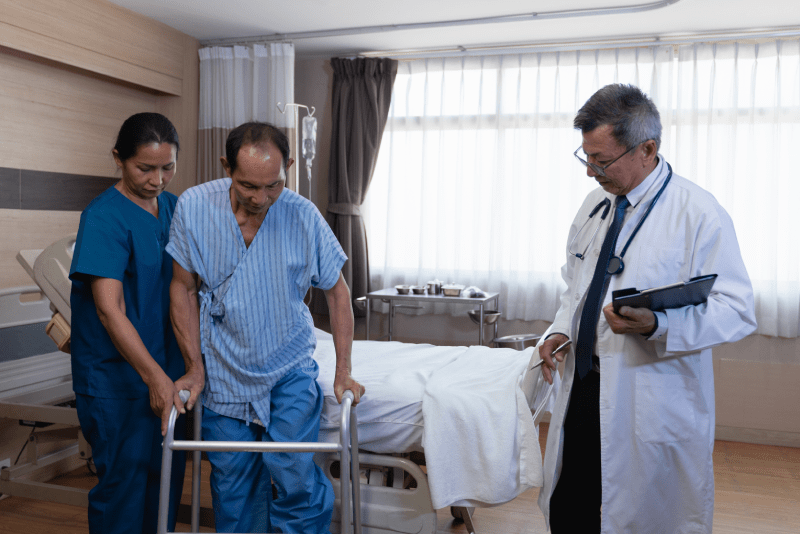
What Is The Biggest Logistic Advantage Of Receiving Treatment In Turkey?
The biggest logistical advantage of having hip replacement surgery in Turkey is the combination of high-quality surgical services at affordable costs, along with close flight proximity and professional process management. Patients from Europe, the Middle East, and North Africa can easily reach Turkey. An expert organization like Cure Holiday coordinates all details such as transfers, accommodation, hospital appointments, and interpreting in a centralized manner, providing a seamless experience that allows the patient and companion to focus solely on recovery.
Why Should Cure Holiday Be Preferred For Surgery In Turkey?
Cure Holiday offers patients choosing Turkey for hip replacement surgery not just the operation, but a comprehensive health tourism experience organized from start to finish. The biggest difference is working with internationally recognized orthopedic surgeons and JCI accredited hospitals most suitable for the patient’s specific condition. They professionally manage all logistical (transfer, accommodation) and communication (medical interpreting) details. This ensures that patients, knowing they are safe at every stage of the treatment process, can devote all their attention to their recovery.
What Cultural Differences Might Be Encountered During The Treatment Process?
Turkey has an extremely hospitable and helpful culture towards foreign patients. Hospitals and health tourism personnel are generally accustomed to international patients and speak English. Although some language differences may be experienced in daily life outside the hospital, the interpreting services provided by Cure Holiday eliminate such barriers. Turkish culture is known for the intense attention shown to the patient and their companion, which creates a warm and supportive environment for your recovery process.
What Physical Restrictions Must Be Adhered To In The Early Post-Operative Period?
Physical restrictions that must be strictly adhered to during the first 6-8 weeks after surgery are in place to prevent the prosthesis from dislocating. These include: not bending the hip more than 90 degrees (not bending over to pick up things from the floor), not crossing your legs, and avoiding excessive inward rotation of the hip. Using elevated seating (high chair or toilet seat riser) and bearing weight as directed by the doctor during walking are examples of these restrictions. Strict adherence to these rules is mandatory for a successful recovery.
How Is Patient Confidentiality Protected In Hospitals In Turkey?
Hospitals in Turkey and health tourism agencies like Cure Holiday strictly adhere to international standards for patient confidentiality and data protection laws (local laws similar to GDPR and HIPAA). Your medical records, treatment information, and personal data are protected with the highest level of confidentiality and are never shared with third parties without your consent. Transparency and reliability are fundamental in all communication and data-sharing processes. Patient privacy is one of the top priorities for Cure Holiday, and the entire process is managed accordingly.
In Which Cases Is Revision Hip Surgery (Prosthesis Replacement) Required?
Revision hip surgery is required in cases where a previously implanted prosthesis has reached the end of its lifespan (loosening), wear of the prosthetic surfaces, joint infection, recurrent dislocations, or fractures around the prosthesis. Revision surgery is generally a more complex and longer operation than the initial surgery. Turkey provides services with surgeons experienced in such challenging revision cases, with international expertise. Planning a revision surgery requires detailed imaging and analysis of bone stock.
Which Chronic Diseases Pose A Risk Before Hip Replacement Surgery?
Uncontrolled chronic diseases before hip replacement surgery can significantly increase surgical risks. The main conditions posing a risk include uncontrolled diabetes (sugar disease), severe heart or lung diseases, obesity, and recent infections. Diabetes, in particular, impairs wound healing and increases the risk of infection. The surgical team requires these chronic conditions to be stabilized before the operation. Cure Holiday will organize all necessary specialist consultations for high-risk patients.
Are Emergency Or Unexpected Interventions Included In The Price Quote?
Standard treatment packages cover the planned surgery and recovery processes. Some emergency interventions that arise during or immediately after the surgery and are under hospital control (such as infection treatment, blood transfusion) may be included in the package scope. However, extraordinary and unexpected situations, such as a patient staying in intensive care for a long period due to a previously unknown serious health problem, generally lead to additional costs. Cure Holiday offers a transparent protocol for such situations, informing you about potential costs in advance.
Is There A Waiting Time For Surgery In Hospitals In Turkey?
The waiting times for hip replacement surgeries in Turkey are much shorter compared to the long public hospital waiting lists in Europe or other countries. Appointments and surgery dates for health tourism patients are quickly determined after reviewing your medical documents. Generally, all pre-operative tests can be completed, and your surgery can be performed within a few days of your arrival in Turkey. You can contact Cure Holiday to establish the most suitable and rapid surgical schedule for you.
Are Flight Tickets And Visa Procedures Included In The Treatment Package?
Treatment packages generally include surgical, hospital, accommodation, and local transfer services. The purchase of flight tickets and visa procedures are the patient’s responsibility. However, Cure Holiday can offer advice on affordable flight options and supports these processes by quickly providing the necessary medical invitation letters and hospital confirmations for visa applications. They will help you manage these aspects of logistics and travel planning in a coordinated manner.
Is Psychological Support Available Before And After Surgery In Turkish Hospitals?
Since hip replacement surgery is a major life change, it is important for patients to receive psychological support before and after the operation. Some large and international service hospitals in Turkey may offer consultations with a psychologist or psychiatrist to enhance patient morale and compliance during this period. This support helps the patient prepare for surgery and manage anxieties related to pain and the recovery process. You can access such support services through Cure Holiday if needed.
Why Should I Get A Hip Replacement In Turkey?
Turkey is an ideal destination for international patients seeking a high-quality, economic, and fast solution for hip replacement surgery. This is because, unlike the long waiting times and exorbitant costs in Western countries, Turkey offers world-class treatment using modern hospitals with international accreditations like JCI and robotic surgical systems. Turkish orthopedic surgeons possess great expertise due to high case volumes and global training. Most importantly, thanks to competitive exchange rate advantages, surgeries performed with the same quality, FDA/CE approved implants are offered at up to 50% more affordable prices compared to developed countries. Additionally, the medical tourism packages offered by Turkey cover all logistical details (transfers, accommodation, translation, and rehabilitation), ensuring patients can focus solely on recovery. By contacting Cure Holiday, which offers all these advantages combined, you can take a step toward a pain-free and active life.
Why Should I Choose Cure Holiday For My Hip Replacement?
Cure Holiday offers international patients a comprehensive and transparent solution that simplifies the entire process of getting hip replacement surgery in Turkey. The biggest advantage is receiving high-quality surgery performed by globally experienced Turkish surgeons in JCI accredited hospitals meeting Western standards, all at a much more affordable cost compared to other countries. Cure Holiday does not only offer a price advantage; they also provide “all-inclusive” packages covering every logistical detail, from pre-operative online consultations to luxury accommodation tailored for you, airport and hospital transfers, 24/7 personal translation and companion support, and comprehensive rehabilitation programs that accelerate your recovery. This allows the patient to focus entirely on their recovery instead of dealing with stressful details, completing the entire process quickly and comfortably under the guidance of a reliable, transparent partner.
